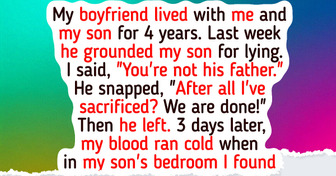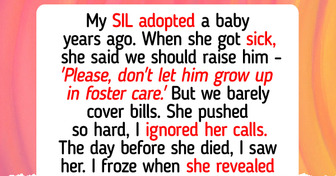Lisa Bonet and Jason Momoa: this is what happens when you marry in completely different states of life (a man who refuses to grow up). Been there, done that.
What Is a “Divorce Gene” and Why Some Couples Split Out of the Blue, According to Science

We inherit our eye color, body shape, and blood type from our parents. Our genes control our physical traits, but, surprisingly, they can also lead us in our behavior. For example, we all used to believe that if a couple gets divorced, it’s all because of their psychology, or the chemistry between them is gone. But recent studies have unveiled a shocking truth: divorce may be in our genes.
Here at Bright Side, we couldn’t keep from sharing what scientists have discovered about the so-called “divorce gene.” Take a look at this mind-teasing genetic game together with us!
Our DNA plays a big part in how much we argue.
Scientists claim the gene affects how women process oxytocin, which is the “cuddle hormone.” It also promotes feelings of love and affection. Women who have the oxytocin affecting gene, are 50% more likely to claim that they’re unhappy in their marriage or even that they are close to a divorce. They just may not be able to bond normally with their partners because of this gene.
Genes also decide if a man will be faithful to his spouse.
Surprisingly, it’s not only the upbringing or the character of a man that decides if he will be committed to one and the same woman. Scientists found that there’s a special gene that is responsible for faithfulness.
Just like women, men have their own hormone that is responsible for bonding and commitment. It’s called vasopressin and some men have a mutation in a related gene. If a man has this gene mutation, he is less likely to be monogamous, so there’s a risk that he’ll be unfaithful to his spouse.
Scientists even suggest the imaginary situation that a woman can use to test her potential husband for faithfulness. All she might need for this is a sample of his saliva sent for genetic testing by a special app.
Parents can pass the special “divorce gene” to their kids too.
Children of divorced parents have more of a chance to divorce their spouses when compared to kids who were raised in 2-parent families. And studies suggest that it’s not the upbringing, but genetic factors that may be to blame.
Studies were done involving kids who were adopted into families and who grew up with adoptive parents. The results were overwhelming: it turns out, the kids inherited their histories of divorce, but not from their adoptive parents. They inherited it from their biological parents. And this happened even if they were separated from their biological parents at a very young age.
What do you think about the “divorce gene”? Which factor, in your opinion, is more important in divorce: the example that parents set or the genes themselves?
Comments
Related Reads
15 Heart-Centered Moments of Human Kindness That Only Happen Once in a Blue Moon

My Boss Treated My Child’s Surgery Like a Joke — I Went to HR

I Refuse to Reschedule My Husband’s Funeral—Even Though My Family Planned a Wedding

I Won’t Sacrifice My Last Good Years Because My Son Refuses to Grow Up

I Refused to Put My Health at Risk Because of My Job, Now HR Got Involved

I Refused to Let My Boyfriend Discipline My Child—He’s Not His Real Dad

I Refuse to Adopt My Dying SIL’s Baby—Her Last Words Left Me Frozen

I Refuse to Work Three Unpaid Weekends to Prove Loyalty — HR Got Involved

I Refuse to Be Treated Like a Servant in My Own Home, So I Had to Draw the Line

I Refuse to Let My Brother’s Girlfriend Control My House—I Put a Stop to It Fast

14 Real Moments When Empathy Changed Everything Forever

My Dad Demanded to Give My Stepsister the Spotlight on My Wedding—But I Reclaimed It





